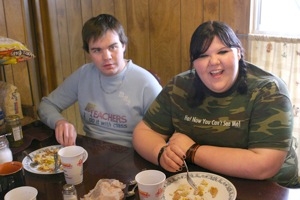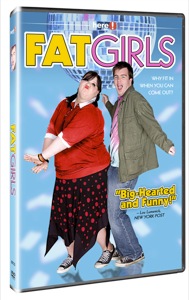-
- Washington state lawmaker’s Spokane scandal is latest case to show the city’s sordid side
- Senate panel tables domestic partnerships
- Moms passed HIV to kids by pre-chewing food
- Civil rights groups, others seek end to ban on U.S. federal funding
- Municipalities barred from joining lawsuit over gay rights
- Gay Mormon group asks for meeting with new church president
- National News Briefs
- World News Briefs
Arts & Entertainment
‘Fat Girl’ Ash Christian: persistence with a vision
Published Thursday, 14-Feb-2008 in issue 1051
In today’s Hollywood, it’s not uncommon for actors to have their hands in several aspects of the movie-making process, playing producer or director whenever they have the chance. Up-and-comer Ash Christian is no exception.
Venturing out on his own before he could vote, the now 23-year-old native Texan has experienced, at a remarkably young age, the varied facets of an actor’s life. He’s appeared in everything from film documentaries to commercials, and has starred alongside legends including Tommy Lee Jones and John Waters, all the while keeping his sights firmly set on supporting and promoting his own creations.
At age 19, Christian wrote his first film, Fat Girls – now available on DVD – about high-school misfits on a quest to find their place in life and love. It went into production the following year and soon after was selected to premiere at the 2006 Tribeca Film Festival. It has since screened at film fests across North America, winning awards for concept and performances.
With a coolness and poise that belies the young talent’s rapid rise to prominence in “basically the hardest profession in the world,” Christian speaks reverently about the opportunities that have come his way during the pursuit of actualizing his life’s dream, offering a refreshingly positive outlook on the typical burgeoning actor’s often rocky road to getting work.
In a recent interview, the young star dishes about transplanting himself from Texas to L.A. at 17 years old; his recipe for perfect comedy; and accepting no substitutes for your true passions – no matter what other people have to say about it.
Gay & Lesbian Times: To have moved alone at such a young age from Texas to Los Angeles shows incredible drive and passion, but to have met with the range of success that you have in just a few short years is a true testament to your talent and vision. Can you describe your early days on the West Coast?
Ash Christian: Thanks. I moved to L.A. alone when I was 17 and got a tiny studio apartment in North Hollywood. Surprisingly, I wasn’t scared when I was in the middle of it. Maybe it’s because I feel older than I really am. Now I look back and I’m freaked out that I was alone at such a young age, pursuing basically the hardest profession in the world. I was inspired and determined. I had to show the people who thought I wouldn’t do it that I could and would. I got a manager when I got to L.A. and started going out on auditions and getting jobs within a few months of being here. I’ve supported myself as an actor/writer/director ever since. Success to me is being able to do what you love, and not having to do anything you don’t.
GLT: In addition to your beginnings in community theater and writing, directing and starring in your own feature-length film, Fat Girls, you’ve starred in other films alongside big-name actors like Tommy Lee Jones and appeared in documentaries, commercials, and on network television. Which is your favorite?
AC: I love film. I think it is so real and amazing to be able to make your audience feel some emotion. I enjoy the money of television, and most of the shows I have done have been pretty great. The experience on such a great show like “Six Feet Under” was amazing and something that I’m very proud of. Commercials are a great way to pay the bills and be able to make the films I want to make.
GLT: San Francisco Station had this to say about Fat Girls: “Pain and discomfort has rarely been so amusing.” Interestingly, none of the characters in the film ever seems to internalize the abuse he or she receives from the opposition, opting instead to either brush it off or retort with equal sarcasm, much to the delight of the viewer. Is Rodney’s signature deadpan style something you had to practice, or do you use the same kind of straight-faced humor in real life?
AC: I was a lot more biting and sarcastic when I made the movie. That was me when I wrote the film. I was totally deadpan – sort of feeling totally dead. I’ve changed since I wrote the film. I’m pretty happy with life and pretty darn cheerful now. There’s a lot to be happy about.
GLT: This film has a stream-of-consciousness feel at times, mainly during freeze-frames and bits of inner monologue. This gives the impression that you put a lot of effort into “collecting” perfect accents and transitions: an awkward silence, a well-placed cuss word. With regard to the writing process, would you say that the material for Fat Girls has been building through the years to become the 82 minutes it is today?
AC: Absolutely. A lot of the things Rodney faces in the film are things that I faced growing up. I thought back during writing and would make notes of funny things that happened and that could happen to these characters I grew to love while writing. Pacing was a huge thing during editing. Comedy is all about timing to me. It’s funny to see how a beat added to a comedic line can take the audience from chuckle to gasping for breath because they’re laughing so hard. My payback is when I make the audience laugh. I love that sound.
GLT: Rodney is every high-school outcast’s champion, remaining incredibly cool in spite of being pranked and scrutinized by his peers. How close was your adolescent experience to his in the film?
AC: I wasn’t quite as secure as Rodney growing up. He sort of just deals with people treating him like a piece of dirt and moves along. I was very sensitive growing up, and the things people did and said really hurt me back then. I’ve since grown a pretty thick skin. I realized these things people say are just words – and something that I have no control over and never will. I just have to do what’s right for me.
GLT: Is the comically narrow-minded religious enthusiasm we see in the film indicative of the Texas you knew from childhood?
AC: Yes. I still know these people! They are in my family. I love them. I don’t blame them for their narrow-mindedness. They’ve never been out in the real world and they don’t understand. It makes me laugh – the religious stuff. It doesn’t make any sense to me that God wants you to hate someone. I refuse to believe or support anything that promotes hate.
GLT: The soundtrack is a combination of well-placed rap numbers and an assortment of indie-sounding rock, with several songs by a band called The Adored. Is this a favorite band of yours?
AC: I love The Adored. They are a cute, little band out of Boston – made up of cute high-school boys. I saw them in concert in New York and put them in the film. Their style fits the feeling of Fat Girls perfectly.
GLT: Your Web site mentions that MTV Networks picked up Fat Girls as a pilot and hired you to oversee production on a series. Will we see “Fat Girls: The Series” in the near future?
AC: Yes, they did hire me – and paid me! We did the pilot, but they decided not to pick it up because it didn’t fit their demographic. I guess they’d rather have shows like “Pimp My Ride” and “My Super Sweet Sixteen” to contribute to our youth’s outlook. Ah – was that bitchy? I didn’t mean it to be! Honest.
|
|
Copyright © 2003-2025 Uptown Publications



